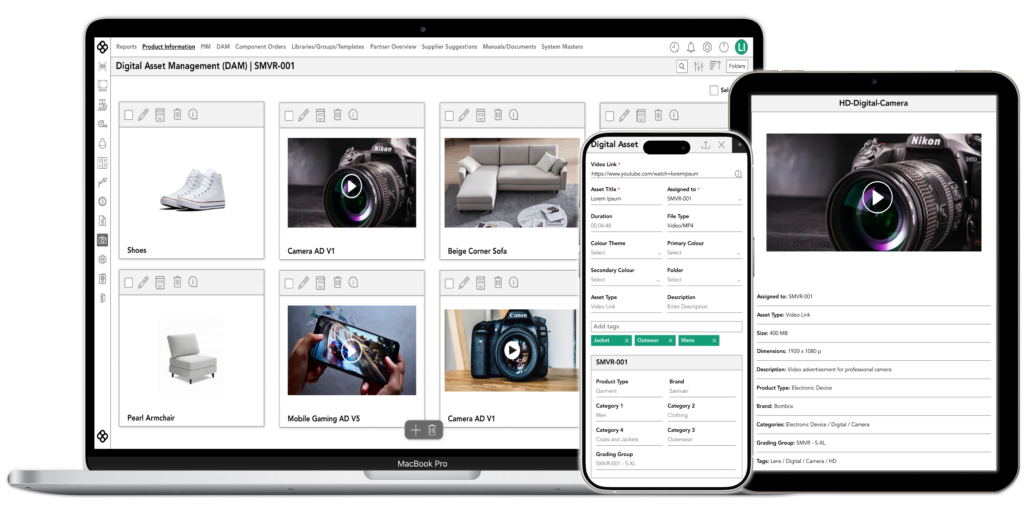What is Digital Asset
Management (DAM)?
A Beginner's Guide
Digital Asset Management (DAM) is an organised vault for all your assets, images, videos, design files and more.
Below, we go through everything you need to know about DAM, its benefits and how to choose the right system for your product team.

DAM explained - everything you need to know about Digital Asset Management
Imagine a space where you can instantly find the images you need, share them with your team and feel confident that everyone is working with the latest, approved version. That’s Digital Asset Management!
DAM software simplifies the chaos of organising your digital assets, removing the need to search through endless emails or folders for the right file.
Why Invest in a DAM System?

One source of truth for all assets
DAM systems give you a central hub where all your images, videos, design files and other assets live, so you can say goodbye to searching different places and inboxes for the right file.

Smarter collaboration
Everyone in your product team can easily share, review and approve digital assets. No more worrying about outdated versions or lost files – everyone has access to the latest, signed-off content, so you can move quickly and confidently

Always have the right file
No more guessing “Is this the right file?”. DAM systems keep track of an asset’s version history and its usage, so you can ensure only approved assets are being used and monitor how and where assets are being used across various channels.

Consistency across multiple channels
A DAM system ensures that everyone in the organisation has access to the latest approved assets, helping maintain a consistent brand identity across all platforms – whether it’s your marketplaces, social media or advertising.

Save time and resources
When all your assets are organised in DAM software, your team spends less time searching, recreating and resharing lost or disorganised files. This means more time to focus on what they do best.

Share assets securely
Thanks to user permissions and access controls, a DAM makes sure only the right people can access and edit certain files, helping you protect sensitive content and comply with regulations, licensing laws and usage rights.

One source of truth for all assets
DAM systems give you a central hub where all your images, videos, design files and other assets live, so you can say goodbye to searching different places and inboxes for the right file.

Smarter collaboration
Everyone in your product team can easily share, review and approve digital assets. No more worrying about outdated versions or lost files – everyone has access to the latest, signed-off content, so you can move quickly and confidently

Always have the right file
No more guessing “Is this the right file?”. DAM systems keep track of an asset’s version history and its usage, so you can ensure only approved assets are being used and monitor how and where assets are being used across various channels.

Consistency across multiple channels
A DAM system ensures that everyone in the organisation has access to the latest approved assets, helping maintain a consistent brand identity across all platforms – whether it’s your marketplaces, social media or advertising.

Save time and resources
When all your assets are organised in DAM software, your team spends less time searching, recreating and resharing lost or disorganised files. This means more time to focus on what they do best.

Share assets securely
Thanks to user permissions and access controls, a DAM makes sure only the right people can access and edit certain files, helping you protect sensitive content and comply with regulations, licensing laws and usage rights.
Loved by product people, trusted by..










What to look for in DAM software
When investing in a DAM system, look for these key features
Centralised access

A single hub for all assets that gives everyone access to the latest, approved assets
Advanced search and metadata

Quick, intuitive search with rich metadata tagging, allowing you to find assets using keywords, categories or custom filters
Security and user permissions

Permissions-based access that gives you control over who can view, edit or share sensitive content.
Collaboration tools

Real-time collaboration and easy sharing with version control, approvals processes and usage monitoring
Integration with PIM

A system that integrates effortlessly with Product Information Management (PIM) and your other systems
Scalability

A scalable DAM that grows with your brand, accommodating more assets, users and future technologies
Centralised access

A single hub for all assets that gives everyone access to the latest, approved assets
Advanced search and metadata

Quick, intuitive search with rich metadata tagging, allowing you to find assets using keywords, categories or custom filters
Security and user permissions

Permissions-based access that gives you control over who can view, edit or share sensitive content.
Collaboration tools

Real-time collaboration and easy sharing with version control, approvals processes and usage monitoring
Integration with PIM

A system that integrates effortlessly with Product Information Management (PIM) and your other systems
Scalability

A scalable DAM that grows with your brand, accommodating more assets, users and future technologies

Dive into Digital Asset Management
Make the complex simple, turning your digital asset management headaches into a streamlined, stress free experience.
Frequently Asked Questions
Below we answer some of the most often asked questions about Product Lifecycle Management
Why is DAM important for marketing and branding?
DAM organises and stores digital assets like images, videos, graphics and brand guidelines in a central location, ensuring brand consistency and allowing marketing teams to quickly access the assets they need, streamlining content creation and maintaining brand identity.
How does a DAM differ from traditional file storage systems?
DAM organises and stores digital assets like images, videos, graphics and brand guidelines in a central location, ensuring brand consistency and allowing marketing teams to quickly access the assets they need, streamlining content creation and maintaining brand identity.
What are the benefits of using cloud-based DAM systems?
DAM organises and stores digital assets like images, videos, graphics and brand guidelines in a central location, ensuring brand consistency and allowing marketing teams to quickly access the assets they need, streamlining content creation and maintaining brand identity.
What types of files can be managed in DAM software?
DAM organises and stores digital assets like images, videos, graphics and brand guidelines in a central location, ensuring brand consistency and allowing marketing teams to quickly access the assets they need, streamlining content creation and maintaining brand identity.